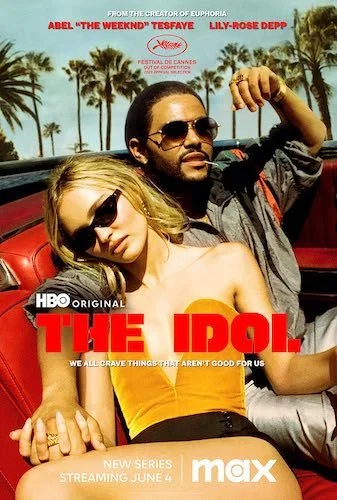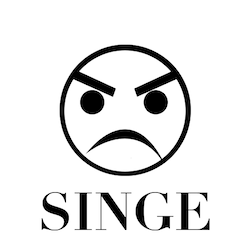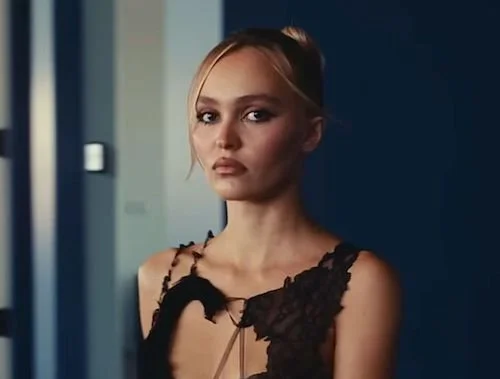The Idol Season 1: Binge, Fringe, or Singe?
Written by Andreas Babiolakis
Binge, Fringe, or Singe? is our television series that will cover the latest seasons, miniseries, and more. Binge is our recommendation to marathon the reviewed season. Fringe means it won’t be everyone’s favourite show, but is worth a try (maybe there are issues with it). Singe means to avoid the reviewed series at all costs.
Warning: this review contains spoilers for The Idol. Reader discretion is advised, if you honestly care for whatever reason.
Can this be the only time I ever have to bring up the botched, lobotomized, vapid “commentary” known as The Idol? I cannot imagine that this atrocious series will be picked up for a second season (I can only pray that it is never considered again), but regardless of the fate of this release I am hesitant to call a “show”, I’m going to go all-out on The Idol once and only once, so read and read well. HBO typically never drops the ball, and neither does A24, but both companies are caught with their pants down (like pretty much every single character, mostly female, in this highly misogynistic series) this time around. I cannot fathom how two prestigious outlets could have green-lit a series this problematic and flat-out stupid. Even if I ignore all of the perversions and toxic male-gaze angles of The Idol (you can pretend it’s a statement all you want: there’s a difference between when you use shock to convey a message properly and when you want to prioritize the shock itself), I cannot get past how excruciatingly poor the writing and direction are here. Let’s get down to brass tacks and analyze all the many ways that The Idol is a festering staph infection of a series.
Before I continue to go all-out, I will briefly recognize the behind-the-scenes issues. I acknowledge that this series was a completely different idea from what Amy Seimetz was working on when creative control was completely transmogrified. Abel Tesfaye, otherwise (formerly) known as The Weeknd, had a different vision in mind and felt that Seimetz’s direction was too “female” (even though this is a cautionary tale about how women are abused in the entertainment industry, but sure, let’s take the focus away from those that have lived from this particular story). Sam Levinson (of Euphoria fame) was brought on to all of Seimetz’s directorial work for the series (Levinson was there from the start as a co-creator with Tesfaye and Reza Fahim). Levinson cleaned up the troubled production (which was already plagued with concerns of unsafe working environments) in a matter of months, clearly with a rush to get The Idol ready for two deadlines: Cannes 2023, and the release of the Max streaming service after both Succession and Barry concluded (Max needed the next big show to usher in new viewers). So there’s a chance that The Idol could have at least been better.
However, I am firmly under the impression that The Idol was never actually destined to be good. It’s impossible. Not with this exact team and these ideas. The Idol always feels like it was made by a fifth grader with mom and dad’s money, an internet history full of porn that the little dipshit was too dull to clear from his search history, and a brief exposure to naughty words (especially “cunt” again and again because he just learned that it is more offensive than “fuck” to many people). Outside of looking nice (can we please stop pretending that poorly crafted works that have nice aesthetics like music videos can pass as proper programming? Because they can’t) and a committed performance from Lily-Rose Depp (who I have wanted better things. for since I was first introduced to her capabilities in Rebecca Zlotowski’s Planetarium, and who put far too much effort into a series that barely cares), The Idol is unwatchable. It is one of the most desperate series I think I’ve ever seen, particularly because it has zero knowledge as to why it should exist or what it is trying to say. The Idol is not just a misfire; it flat-out kills itself while aiming elsewhere. To make an analogy as dated as this series is even a day after its season finale, The Idol full-on Dick-Cheneys itself.
I know Lily-Rose Depp has famous parents and it’s fashionable to point fingers and claim “nepo baby”, but can someone please put her in something worthwhile for once? She’s actually trying and no one seems to care.
So Jocelyn (Depp) is a pop star on the rise and has to deal with the brunt end of a skewed industry that pits women together, objectification, and trauma after the death of her allegedly abusive mother. After some scandals have broken out (The Idol can’t just resort to being gross and slut shaming via social media: it fully has to show an image of her face caked in penile expulsion, for lack of a better description) and some rehearsals have gone horribly wrong, Jocelyn feels the pressure during her already fragile state. She gets connected with cultish nightclub owner Tedros (whose name sounds eerily like “Tedious” and you wouldn’t be wrong for mishearing this), who has secretly been trying to get a hold of her for his own gain for quite some time (basically grooming with extra steps). Tedros lives vicariously through Jocelyn to try and get his own ideas out through a troubled, vulnerable girl (ew), and the two have a lot of sex (The Idol feels excessive with these scenes; I’m no prude, but I’m also no longer a tween that’s just discovered what fornication looks like for the first time).
The Idol has some of the worst character progression in any series or film in quite some time. Tedros just stalks Jocelyn around like that kid that is trying to get a girl to dance with him at the club, and then he just squawks like a crow that landed too hard on a branch and crushed his testicles. Meanwhile, Jocelyn is never taken seriously by the camera or screenplay; even when she finally seems to be blossoming, it’s revealed via an awful twist that everything she did was for Tedros (which also makes zero sense given some of the particular fights they both had and their ramifications). Before we get there as quickly as the series does, let’s cover what happens: Jocelyn meets Tedros. They fine-tune a song that Jocelyn doesn’t want to sing but is forced to by her management team. They start being together. Tedros then acts like he owns the place. Jocelyn tells him he doesn’t after he goes too far. She kicks him out and promises that she now has autonomy and will make sure her upcoming tour kicks ass via her jurisdiction. The joke’s on us: she actually wanted Tedros in her life all along.
When Jocelyn’s team is left dumfounded that Tedros is given the floor in Jocelyn’s return to the stage at the end of the season, I think we are all feeling the same way because the twist doesn’t work logically, nor does it represent any form of movement whatsoever in the series (so we’re still at the same level of growth that we had at the end of the first episode? Got it). Effectively, the more Jocelyn tries to make it as a star on her own after she “gets tired of Tedros and his manipulation” (but not really), the more she is actually fooling her own team so she can both succeed and be with Tedros. I cannot even go into all of the reasons why this is stupid. She is brainwashed yet cognizant of the fact that she is being used so she will only be manipulated by the person she chooses to be manipulated by whilst not falling for the tactic of others. How stupid do Levinson and Tesfaye think women are?
If The Idol is meant to be a biting satire on the entertainment industry, then it is the new Showgirls without the self-awareness (I will defend Showgirls as a mostly misunderstood self-parody, but The Idol thinks it is The Neon Demon when it is an edgy high schooler’s project for drama class). It is begging us to understand that Jocelyn is what happens when you place unprepared people — particularly women that have to deal with the sexist ways of society — in a dangerous industry (show business) and have them face manipulators like Tedros. Well, The Idol is hypocritical as it is as guilty of its own perversions as the monsters it depicts. It renders Jocelyn as an impuissant damsel in distress (for a series that comments on how thirsty the music industry is, it cannot help but encourage Lily-Rose Depp to be nude as frequently as possible). She “needs” to be saved by someone, but who will stop exploiting her for one second to help her out? I’ve seen stories handle this sort of ideology a lot better because the harsh reality is that no one will assist those that are fortunate but in a state of helplessness, but The Idol never even attempts to fully explore the realities of this conversation. It settles for the bare minimum; toxic people drink and swear a lot, so let’s have Tedros not be a fully fleshed-out villain and instead be resorted to a barking toy papillon; sex sells, so let’s keep making almost every character either a horny idiot or someone that must play by the game; the world will devour whatever you feed it, so let’s just shit out The Idol knowing that everyone will just accept what they’re told to like.
Well, I think most people caught on to the fact that The Idol is an unfinished, unacceptable, surface-level, snivelling fart of a series that does the bare minimum narratively and exhausts as many taboos as possible to demand that it is going to be the next big show. News flash: it isn’t. I don’t want to come off as too hostile even though I already have, because I think everyone strived for something a little more substantial while working on The Idol, but it never gets there, and there are enough poor decisions that lead me to believe that not everything was properly decided upon with the best interests of proper storytelling, messaging, and the audience at home in mind. The story clunks along plot point by plot point, while the sex feels frustratingly endless (like I’m forced to watch these scenes by a male friend that swears this is art when he’s just feeding his addictions). The characters are croaking heads that either churn out platitudes that sound like they came out of a porno, are swear-laden diatribes that you’d find on an online forum from a basement dweller, or are all sharing the same joke no one gave a shit about the first time (“don’t trust someone with a rat tail”).
What are we learning or analyzing about idol culture that we don’t already know? What does The Idol tackle differently about this subject? What is actually clever about this approach? Do we gravitate towards any of the characters outside of Jocelyn (who also winds up pushing you away at the very end of the series when it’s decided that she can be a manipulator as well)? Are Jocelyn’s songs meant to sound awful as a satirical punchline, or are they intended to sound great but actually aren’t? Does The Idol know how much it’s backpedalling when it wants to dissect the problems with sexualization when it is one of the worst examples out there? Does The Idol know how story structure works at all, or how to utilize characters (forget the side ones, it doesn’t even know what to do with its two mains)? Does The Idol know that proper characterization and growth are needed before we head toward the next chapter? One minute, Jocelyn and Tedros can’t stop touching each other, and the next she’s deciding that she never needed him with no rhyme or reason.
Does The Idol even need to exist?
I cannot pinpoint a single thing that leads me to believe that this needed to happen, outside of knowing that Seimetz left due to creative differences. What was the original idea going to be? I cannot fathom any sort of idea as to what a good version of The Idol would have been. I expected this to not be good, but The Idol was so much worse than I was prepared for. It isn’t just a dud: it’s completely one of the most poorly conceived series in recent memory. The Idol is what you get when too many visual artists get carried away with music video aesthetics in the wrong medium (you can’t get away with these alone here). The Idol is the result of the streaming age when companies get carried away with approving those that can afford to jumpstart their ideas. The Idol is what you get when people with money and name recognition get carte blanche when they haven’t provided actual reasons of merit for a project to go forward. The Idol is a major signifier of what mid-to-late game streaming looks like, so maybe that’s reason enough to exist.
When Jocelyn’s upcoming single, “World Class Sinner” (ooo, so deep), plays near the start of the first episode of The Idol and you hear the lyric “don’t give a fuck at all”, that should be a red flag. Almost nothing in The Idol cares about the right things. It substitutes story for sex, purpose for aimless yelling of problems we’re already aware of, and care for the victimization of those the series pretends to be defending. If you want to know what diabolical writing looks like underneath a terrific budget and why proper screenwriting is always needed even for productions that can’t afford to appear nice, watch The Idol: a self-sabotaging shitstorm of indulgent lunacy that tries to worm its way amongst the most effective social commentaries of our time when it is as deep as a toddler hitting you with that “I know what you are, but what am I?” The Idol is unquestionably one of the worst series of the last few years, but I also expected much more from pretty much everyone involved (outside of Lily-Rose Depp who carries the series to the point of buckling and breaking her own bones to try and save the project). Painful doesn’t even begin to describe this one. There’s no word that accurate depicts what agony one feels when watching The Idol outside of, well, The Idol.
Andreas Babiolakis has a Masters degree in Film and Photography Preservation and Collections Management from Toronto Metropolitan University, as well as a Bachelors degree in Cinema Studies from York University. His favourite times of year are the Criterion Collection flash sales and the annual Toronto International Film Festival.





